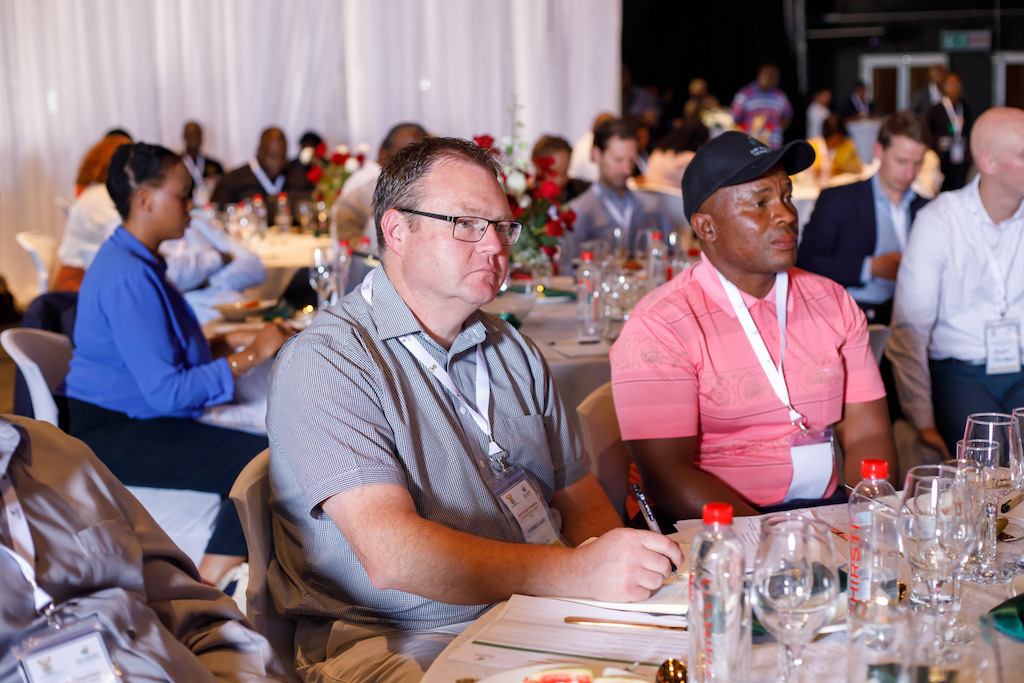
12 Nov We asked – the PMU has answered
New matchmaking platform for green energy funding offers solutions to coal-dependent communities at the frontline of SA’s energy transition, Thabo Molelekwa reports

This is how we roll: Khwezikazi Windvoel, senior manager of climate finance and innovation at the Presidential Climate Commission, at the Mpumalanga launch. Photo courtesy PMU
Eighteen months after the Oxpeckers #PowerTracker project started reporting about how environmentalists and coal-dependent communities were being left in the dark by the Just Energy Transition (JET), a new digital platform has been launched to assist local green projects to secure funding.
Launched last month in Mpumalanga, the heartland of South Africa’s energy transition, the platform signals a new chapter for communities and small businesses at the centre of the transition. It connects international grant funders with local projects, and facilitates access to concessional financing and grants.
Since early 2023 #PowerTracker has reported on significant concerns voiced by coal-affected communities and small businesses operating within South Africa’s coal belt. Local stakeholders expressed frustration over limited access to funding, lack of clear support channels for capacity building, and a perceived disconnect between high-level JET goals and the on-the-ground realities faced by impacted communities.
In an article titled Left in the Dust, for example, Philani Mngomezulu from the Khuthala Environmental Group highlighted how the lack of meaningful consultation with these communities had created resistance and uncertainty around the transition. Community members like Mathapelo Khoza expressed fears of being sidelined by the JET, and artisanal miners said coal industry closures would impact their livelihoods.
Our investigation Are municipalities good for JET money? highlighted the financial challenges and lack of transparency within many municipalities in the region. Often considered “non-bankable” due to poor financial management and a lack of clean audits, these municipalities struggled to meet the standards necessary for fund allocation, posing a major barrier to the effective use of JET funds and hindering Mpumalanga’s efforts to move towards a sustainable energy future.
How it works
The JET Funding Platform’s community-oriented approach aims to address many of these concerns. By prioritising initiatives such as community-owned renewable energy models and reskilling programmes, the platform aims to deliver practical and accessible solutions directly to those who need them most.
The most recent grants register shared on the platform (Quarter 3 of 2024) indicates there is more than R700-million available for potential JET projects. Quarterly updates to the grants register reflect commercial investments, public-sector expenditure and blended finance.
The platform is not a fund itself; rather, it describes itself as “a service to connect grant funders with JET-aligned projects in need of financial and technical support. Its main purpose is to help projects become ‘grant-ready’, enabling them to attract local and international funding sources and prepare for future investment opportunities.”
It is positioned as a “matchmaking” service, facilitating partnerships between international funders and local organisations, community groups and government entities with JET-aligned goals. “Importantly, this platform seeks to ensure that these resources reach the grassroots level, enabling workforce transitions, economic diversification, and social support for the communities that need it most,” it states.
“The transparency of this public registry ensures funders have a comprehensive view of projects available for funding, allowing them to select projects that best align with their mission and goals.”
The current application window closes on December 13 2024. Project assessments are expected to be completed within 90 days, allowing funders to begin their reviews in early 2025.

Serious business: Stakeholders at the JET platform workshop included representatives from government bodies, civil society organisations, educational institutions and private-sector entities. Photo courtesy PMU
Mpumalanga launch
At the launch workshop in Mpumalanga, the JET project management unit (PMU) offered local stakeholders a comprehensive look at the platform’s mechanics and its application processes. The session was attended by a diverse group, including representatives from government bodies, civil society organisations, educational institutions and private-sector entities.
According to the PMU, parties eligible to apply via the platform include companies, NGOs, public entities, educational institutions and other registered entities aligned with the JET mission. This includes a focus on climate mitigation, community empowerment and transformative impact.
The platform uses a pre-qualifying system to assess applicants, ensuring they meet essential governance and compliance standards before undergoing an in-depth evaluation. Funders have the final say on whether to finance a project and conduct their due diligence before committing any resources.
Once a project is funded, the PMU continues its role in monitoring and evaluating its progress. Through regular updates on the JET grant register, stakeholders can track each project’s development and impact on a continual basis.
“This real-time tracking capability provides an additional layer of accountability, ensuring that projects adhere to the intended objectives and deliver measurable benefits to their communities,” the platform states.
• Find the JET Funding Platform here
• Find more investigations and track renewable energy projects on our #PowerTracker platform here
